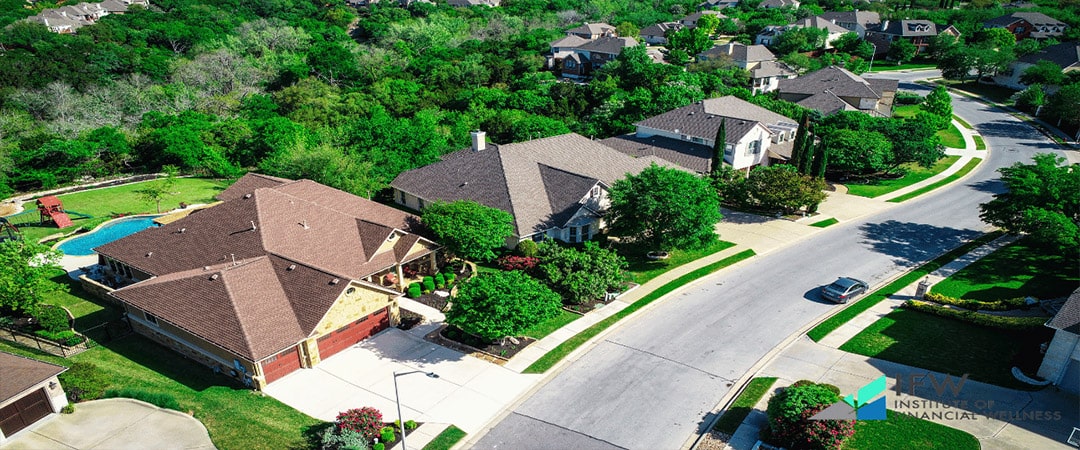“Real estate cannot be lost or stolen, nor can it be carried away. Purchased with common sense, paid for in full, and managed with reasonable care, it is about the safest investment in the world.” Franklin D. Roosevelt, U.S. president.
The ground under your feet is valuable and they aren’t making any more. Are you considering using real estate investments to secure your financial future during retirement? It’s probably time for you to consider passive real estate investing.
Passive real estate investment allows people to generate income without having the burden of actively managing properties. Buckle up because we will take an in-depth look at what benefits can come from implementing such methods and explore various strategies that could help build a diversified portfolio leading towards financial security after retiring.
Key Takeaways
- Passive real estate investing offers diversification, a steady income stream, and potential tax advantages.
- Diversifying investments, researching the market, and seeking professional advice are essential for successful passive real estate investing.
- Understanding different investment vehicles such as REITs, crowdfunding platforms, and turnkey rental properties is key to creating an effective portfolio.
Understanding Passive Real Estate Investing
Passive real estate investing is a type of investment that allows you to gain from property ownership without the need for regular management. It’s the dream. Make money while you sleep. Hard work upfront with massive payoffs later in life.
Passive investors are able to collect income by way of cash flow or appreciation while taking advantage of tax benefits and leverage. This method stands in contrast with active real estate investing, which requires an owner’s more involved supervision over properties they hold interests in.
But if you are looking at retirement, you will probably prefer to spend your time enjoying an active lifestyle, and not managing properties. If that’s the case, passive is the way for you.
When considering entering into this market, it’s important to understand how these investments work: as you’ll be making a profit passively, generate returns through consistent incomes rather than speculative strategies employed when engaging actively with your estates. At the same time, enjoy low risk associated with a hands-off approach towards rental opportunities available on the marketplace today!
What is passive real estate investing?
Real estate investing through passive methods such as REITs, crowdfunding platforms, and remote ownership allows investors to generate a regular source of income without the burden of directly managing the property.
This type of investment strategy is an ideal way for those looking to build their retirement nest egg or just achieve some financial security by utilizing real estate investments. It is possible to gain steady returns with only minimal effort on your part if you opt for this form of passive realty investing.
Benefits of Passive Real Estate Investing
Passive real estate investing is an attractive option for diversification and earning a steady income stream, whether to supplement retirement or fund other investments.
- Hands-Off Approach: Unlike active investors, passive real estate investors aren’t involved in daily operations, making it ideal for those who aren’t interested in property management tasks like tenant issues, maintenance, and repairs.
- Diversification: Real estate can serve as a hedge against the volatility of other investments, like stocks or bonds, adding diversification to an investment portfolio.
- Steady Cash Flow: Many passive real estate investments, especially those involving rental properties, generate regular rental income, providing a consistent cash flow.
- Tax Advantages: Real estate investments can offer tax benefits, including depreciation and the potential to offset income with property-related expenses.
- Appreciation Potential: Over time, real estate properties can appreciate in value, which could result in capital gains for the investor.
- Inflation Hedge: Real estate often acts as a hedge against inflation. As living costs rise, so too can rental rates and property values.
- Leverage: Investors can use leverage (financing) to acquire real estate, potentially increasing returns on the capital they invest.
- Access to Professional Management: Passive investors often invest through platforms or partnerships where professionals handle acquisition, management, and disposition of properties, ensuring optimized returns.
- Lower Time Commitment: Without the need for hands-on management, passive real estate investing can be less time-consuming than active investing.
- Portfolio Growth: By reinvesting returns, investors can grow their portfolio over time, benefiting from the compounding effect.
- Ease of Entry: Through Real Estate Investment Trusts (REITs) or crowdfunding platforms, investors can start with a smaller capital outlay than purchasing properties outright.
- Risk Mitigation: Diversifying across multiple properties or types of real estate (e.g., residential, commercial, industrial) can spread and potentially reduce risk.
With the ability to spread your risk by choosing different types of properties in multiple locations through these passively managed real estate strategies, you can also be confident that any volatility will not negatively affect too greatly on your portfolio.
Retire Early with Real Estate (F.I.R.E.)
Rental properties are a great way to begin building wealth and achieving financial freedom earlier in life. By investing in rental units, you can generate a continuous stream of passive income that will help fund your retirement plans.
Through the right selection process, investors gain an array of advantages, such as diversifying portfolios, capitalizing on tax benefits, or simply earning more over time by consistently growing their assets using this approach. The rental property retirement formula helps calculate how much cash-on-cash return investments yield so users know exactly what kind of portfolio is required for them to achieve their goals concerning money and retiring early with the assurance they made wise choices along the way.
F.I.R.E. stands for “Financial Independence, Retire Early.” It’s a movement and personal finance strategy in which individuals save and invest with the goal of achieving financial independence and retiring earlier than the traditional retirement age. Here’s a breakdown of its components:
- Financial Independence (FI): This is the point where one’s savings, investments, and passive income sources are sufficient to cover living expenses without needing to work for money actively. It doesn’t necessarily mean one stops working, but rather that work becomes a choice.
- Retire Early (RE): Once financial independence is achieved, one has the option to retire early. For some in the F.I.R.E. community, this might mean retiring in their 40s or even 30s, though the age varies based on personal goals and circumstances.
Real estate has the fewest risks and highest returns, making it perfect for anyone who wants to retire early.
Types of Passive Real Estate Investment Opportunities

“Ninety percent of all millionaires become so through owning real estate. More money has been made in real estate than in all industrial investments combined. The wise young man or wage earner of today invests his money in real estate.” Andrew Carnegie, billionaire industrialist.
Real estate investment offers various passive options that come with different qualities and rewards. We will cover 3 common opportunities: real estate investment trusts (REITs), crowdfunding platforms, and turnkey rental properties. All of these provide investors with a varying degree of involvement in order to cater to their individual objectives as well as the potential returns they could get from it. No matter what your goals for investing in property are, there is definitely something here suitable for you!
Real Estate Investment Trusts (REITs)
Real estate investment trusts (REITs) provide a great opportunity for passive real estate investors by allowing them to hold and manage diverse portfolios of properties without directly owning them. REITs are corporations that invest in various kinds of real estate, offering professional management along with the capacity for income generation.
Such investments also require legally mandated distribution of at least 90% of their taxable income as dividends to shareholders, thus providing a convenient means for generating regular passive incomes from these resources.
Investing in a trust allows one access to this ideal combination- capital appreciation plus tax-efficient returns on holdings – making it an attractive option among those interested in investing passively but still gaining exposure to different types of real estate assets.
Crowdfunding Platforms
For real estate investors, crowdfunding platforms can be an attractive option due to the low capital requirements and diversified portfolios they offer. They provide a convenient way for people to join forces and invest in different kinds of properties located all over the world with ease. These innovative platforms connect users with entrepreneurs or developers who are looking into investing in property markets, which makes passive real estate investment much more accessible than before, potentially leading to high returns on their investments!
Turnkey Rental Properties
Investing in rental properties can generate income with minimal involvement when you purchase turnkey rentals, which are pre-vetted and managed by a property management company.
When considering how many of these real estate investments to make, it’s important to consider your financial goals as well as risk tolerance and potential benefits from working with such companies. Such an approach could offer convenience while still providing the reward of building wealth through rentals that don’t require active maintenance or oversight on your part.
Assessing the Risks and Returns of Passive Real Estate Investing

“The best investment on Earth is earth.” Louis Glickman, real estate investor.
When it comes to passive real estate investing, understanding the rewards and potential hazards is key. Some of the risks include tenant turnover rates, market fluctuations, and repair costs, all of which could potentially affect your investment results.
At the same time, possible returns from passive real estate involve cash flow appreciation as well as leveraging opportunities that lead up to retirement via steady streams of passive income. In our next discussion, we will delve into analyzing both prospects associated with this type of property investment!
Risk Factors
When it comes to passive real estate investing, as with any other investment, there are potential risks. These can include bad locations, negative cash flows, high vacancy rates, and problem tenants. Lack of liquidity or hidden structural issues that could occur when purchasing the property, plus market risk and leverage risk too. To safeguard against these kinds of situations, diversifying investments is key alongside researching in-depth into local markets while understanding laws & regulations related to estates ( To seeking advice from industry professionals).
Expected Returns
When it comes to passive real estate investing, the returns can be impacted by various elements such as location and market conditions. Speaking, these investments offer a dependable source of income that could bolster retirement funds or support other investments.
By choosing well-considered options for your portfolio and closely tracking their progress, you will find success in optimizing an effective strategy with maximal rewards when it comes to passive real estate investment, though active real estate also remains another potential option one should consider.
Tax Advantages of Passive Real Estate Investing

Passive real estate investing offers several tax advantages that can help maximize investment strategies and save money. We will take a closer look at these benefits, namely deductions, depreciation, as well as 1031 exchanges, which are all accessible when it comes to passive estate investments.
Deductions
Real estate investing can be a great way to reduce your taxable income. Through deductions of mortgage interest, property taxes, and other related expenses associated with owning real estate in the passive form – you can save substantially on the tax amount due.
By taking advantage of these deductions available through passive real estate investments, it is possible to significantly cut down how much you owe Uncle Sam at year’s end.
Depreciation

In real estate investing, investors can take advantage of the benefits associated with depreciation. This method allows them to deduct a certain amount from their taxes each year and spread out the cost of purchasing property over its useful lifetime span. Passive investment in real estate specifically helps reduce taxable income while reaping those tax perks related to such investments. Allowing for depreciation gives an added bonus that should not be overlooked when considering getting into any type of real estate investing endeavors!
1031 Exchanges
Through using 1031 exchanges, individuals can defer taxes and potentially increase their wealth in the long term. This financial strategy allows people to swap one investment property for another without incurring capital gains tax liabilities due to Internal Revenue Code Section 1031. As a result of this incentive, profits from selling an existing asset are reinvested into buying similar investments instead of being taken out as taxable income right away.
Building a Passive Real Estate Investment Portfolio

Creating a diversified passive real estate portfolio is an integral component of effective passive property investment. By spreading your investments across different assets, you can reduce risk and develop the best strategy for investing in real estate.
Next, we’ll delve into why it’s so important to create a diverse plan as well as to keep watch over all our invested properties.
Diversification Strategies
To limit risk and secure potential returns, diversification strategies involve investing in diverse properties, locations, and investment vehicles. Examples of such property types include single-family homes.
Multi-family dwellings, condos, as well as commercial real estate investments. To these options, one could also take advantage of other opportunities such as Real Estate Investment Trusts (REIT) or crowdfunding platforms when aiming for Minimization of risk while maximizing their gains.
Monitoring Performance
It is essential to continually observe the effectiveness of your investments in order to make informed decisions and modify your portfolio as needed. Keeping tabs on how your holdings are doing over time, examining each investment’s performance independently, and contrasting them with market benchmarks may help you detect any risks and put corrective steps into motion.
Being aware of the progress of real estate assets helps ensure success by enabling the optimization of a passive real estate investing plan.
Tips for Successful Passive Real Estate Investing

In order to benefit fully from passive real estate investing and ensure financial security during retirement, it is imperative that one follow a few key practices. To help achieve success with this type of investment strategy, we’ve compiled some advice, including doing research, connecting with others in the field, and seeking expert guidance.
Research and Education
Investing in passive real estate requires that you equip yourself with the right knowledge. Research and educate yourself on various investment options, current market dynamics, as well as potential risks involved for optimal results.
This means tapping into online resources such as articles and webinars. Attending seminars or signing up for an online course should be beneficial, too, so that you remain abreast of new trends in this industry.
Networking and Collaboration
Making connections with investors and individuals in the industry can be a tremendous help. Get involved in events and join online chatrooms and social platforms – this will all contribute to extending your network of contacts as well as offer chances to gain knowledge from other people’s experiences.
Through collaboration on ideas, you can grow a better understanding of different markets, which should lead to wiser investment selections overall.
Seeking Professional Advice
Obtaining professional advice from financial planners, tax advisors, and real estate specialists is a great way to make smart choices that optimize your investment plan. These professionals can furnish assistance on current market trends, appropriate property selection, various financing alternatives as well as efficient management strategies for any passive real estate investments.
By consulting knowledgeable experts in the field of finance and real estate one could rest assured that all decisions they are making will be beneficial to their long-term fiscal goals.
Institute of Financial Wellness
The Institute of Financial Wellness is a multi-media network that offers comprehensive financial education, resources, and services to help people manage their investment portfolios and achieve financial success. The organization’s mission is to help people “Get There” and live their best life. To achieve this, they provide five unique value propositions.
This company offers the industry’s most engaging, informative, and objective financial education content, designed to help individuals understand the complex world of finance and make informed financial decisions. By providing unbiased and objective information, the Institute of Financial Wellness ensures that individuals have the knowledge they need to make sound financial choices.
Full Summary
For those who are looking to ensure their financial future and benefit from tax advantages, passive real estate investing is the ideal solution. By researching different investment options, keeping up with best practices, and understanding how this type of estate investing works can lead to a well-balanced portfolio that produces consistent income while providing essential stability during retirement age. Now more than ever, it’s important for people to take action in order to secure their investments through passive real estate opportunities.
Frequently Asked Questions
What is the best passive real estate investment?
Real estate investments can generate passive income through two main ways. Investing in rental properties or purchasing publicly traded real estate investment trusts (REITs). If done correctly, an investor could create a steady stream of revenue from their rent and build equity when making improvements.
What is an example of a passive real estate investment?
Passive real estate investments can be achieved by investing in REITs, participating in crowdfunding endeavors, or putting money into remote ownership and real estate funds. These types of passive investments provide a way for investors to capitalize on the financial benefits of owning property without having to do all the maintenance and management.
How to earn passive income in real estate with $1,000?
For just $1,000, you can start generating passive income with Real Estate Investment Trusts (REITs), Crowdfunding, House Hacking or Shared Rentals, Peer-to-Peer lending, and Wholesaling Properties, all forms of real estate investment.
What is the best passive income for retirees?
Retirees can gain a worthwhile passive income through investing in real estate, such as REITs and rental properties, mutual funds together with dividend-paying stocks like Fixed Deposits (FDs) or Senior Citizens Savings Scheme (SCSS). These options offer an attractive way to acquire a steady stream of revenue.
What is the primary difference between passive and active real estate investing?
Real estate investing can be approached from two perspectives. Passive and active. Passive real estate investing involves less effort but still produces a revenue stream, while active investment entails actively managing the properties to achieve desired outcomes.




